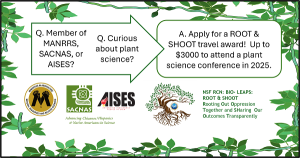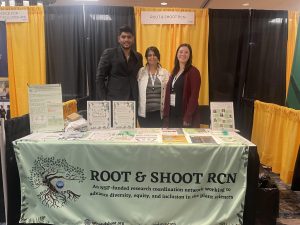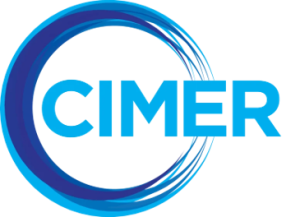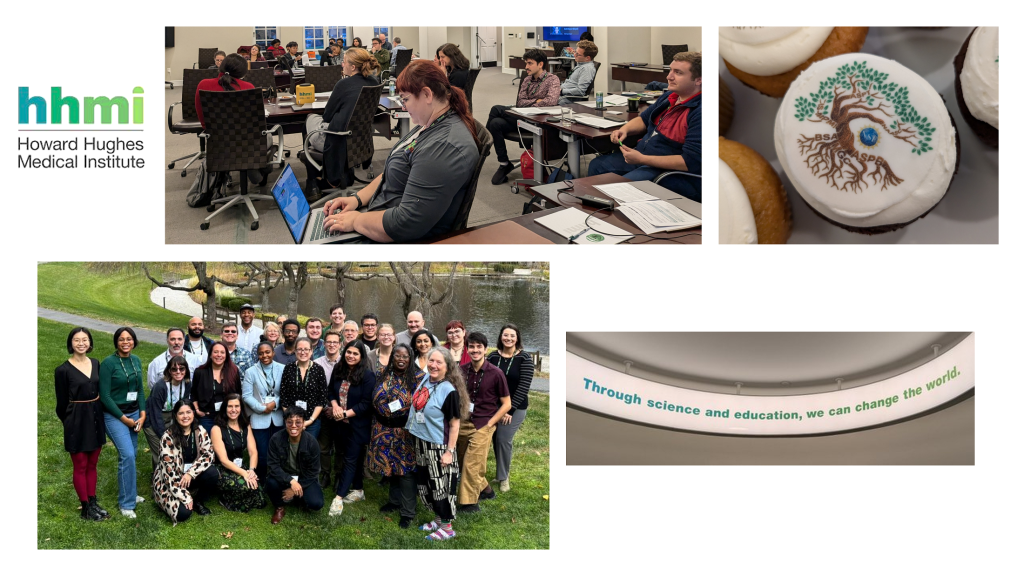The NSF funded ROOT & SHOOT project has had a busy year this year! As we are finalizing our plans for the final two years of the grant period, we will start with a brief review of what we have accomplished this year.
Partnerships with SACNAS, MANRRS and AISES: Travel awards and informational exhibits
 In 2024, ROOT & SHOOT provided funds for 31 people to travel to one of five plant science conferences. These travel awards are provided to student/ mentor pairs when at least one of the pair is a member of SACNAS, MANRRS, or AISES. The awardees are selected based on their engagement with one or more of these societies, the commitment of the mentor to provide on-site support to the student, and their interest in plant biology. The 2024 awardees are listed here. The 2025 travel award applications are closed and we will shortly announce the successful applicants.
In 2024, ROOT & SHOOT provided funds for 31 people to travel to one of five plant science conferences. These travel awards are provided to student/ mentor pairs when at least one of the pair is a member of SACNAS, MANRRS, or AISES. The awardees are selected based on their engagement with one or more of these societies, the commitment of the mentor to provide on-site support to the student, and their interest in plant biology. The 2024 awardees are listed here. The 2025 travel award applications are closed and we will shortly announce the successful applicants.
 Similarly, ROOT & SHOOT provides information about career opportunities in plant sciences to students attending the SACNAS, MANRRS, and AISES conferences each year by hosting an informational exhibit and/ or a career development workshop at those society conferences. Each year, one or two plant scientists are selected to aid in this effort by attending the conference. You can read about these outreach efforts at our blog: SACNAS professional development workshop, MANRRS conference experience by Mohit Mahey, Experience at the 2024 MANRRS Annual Conference by Carolina Ballén-Taborda, and Exhibiting at the 2024 AISES Annual Conference. Watch this space, as we will soon be looking for volunteers to help us promote plant science at the 2025 conferences!
Similarly, ROOT & SHOOT provides information about career opportunities in plant sciences to students attending the SACNAS, MANRRS, and AISES conferences each year by hosting an informational exhibit and/ or a career development workshop at those society conferences. Each year, one or two plant scientists are selected to aid in this effort by attending the conference. You can read about these outreach efforts at our blog: SACNAS professional development workshop, MANRRS conference experience by Mohit Mahey, Experience at the 2024 MANRRS Annual Conference by Carolina Ballén-Taborda, and Exhibiting at the 2024 AISES Annual Conference. Watch this space, as we will soon be looking for volunteers to help us promote plant science at the 2025 conferences!
Promoting inclusive conferences
Conferences are important ways for scientists to share their research, learn from others, and engage in all-important networking, but many studies have shown that they can also provide unique challenges for those with historically underserved identities (e.g., Black, Indigenous, Latine, disabled, LGBTQ+, women and other gender minorities).
 ROOT & SHOOT has been working to address these challenges and change the culture of conferences in several ways. First, we assembled a working group that has spent more than a year developing a set of recommendations for conference organizers, available as a short and long version. Second, we have begun to implement some of those recommendations, including hosting Bystander Intervention Trainings led by AdvanceGeo; stay tuned for more sessions to be held in 2025. Third, we have hosted ombduds and advocates onsite in five conferences in 2023 and 2024, and fourth we are exploring non-punitive, restorative justice approaches for dealing with harm. A manuscript describing these efforts is in preparation for publication in 2025.
ROOT & SHOOT has been working to address these challenges and change the culture of conferences in several ways. First, we assembled a working group that has spent more than a year developing a set of recommendations for conference organizers, available as a short and long version. Second, we have begun to implement some of those recommendations, including hosting Bystander Intervention Trainings led by AdvanceGeo; stay tuned for more sessions to be held in 2025. Third, we have hosted ombduds and advocates onsite in five conferences in 2023 and 2024, and fourth we are exploring non-punitive, restorative justice approaches for dealing with harm. A manuscript describing these efforts is in preparation for publication in 2025.
Mentor training for social identity awareness
 A third major effort has been the development of a free, synchronous training program for mentors to help them develop awareness of how social identities impact the mentor / mentee relationship. This program is in the final stages of alpha testing and we will shortly release a call for beta testers, with the goal of a formal launch in 2025. We are developing this training program with advisers from CIMER (Center for the Inprovement of Mentored Experiences in Research) who have extensive expirience with mentoship training programs.
A third major effort has been the development of a free, synchronous training program for mentors to help them develop awareness of how social identities impact the mentor / mentee relationship. This program is in the final stages of alpha testing and we will shortly release a call for beta testers, with the goal of a formal launch in 2025. We are developing this training program with advisers from CIMER (Center for the Inprovement of Mentored Experiences in Research) who have extensive expirience with mentoship training programs.
 Looking ahead to 2025
Looking ahead to 2025
We have exciting plans for 2025, including the launch of a symposium on seminar series on Cultivating a Culture of Inclusive Excellence in Plant Science, that we will share very soon. Following a three-day strategic planning retreat at the HHMI conference center in Maryland, we will continue building on the collective strengths of the ROOT & SHOOT-affilicated organizations to provide additional support, guidance, and training for plant scientists. We will be announcing these new initiatives in early 2025.
All of this work is being carried out by plant scientists, as members of the Steering Committee and Working Groups, with the guidance and support of our Experts Committee and Expert Consultants. We thank everyone who has contributed to this project in the past year and especially the NSF BIO-LEAPS program for funding.
0 Comments